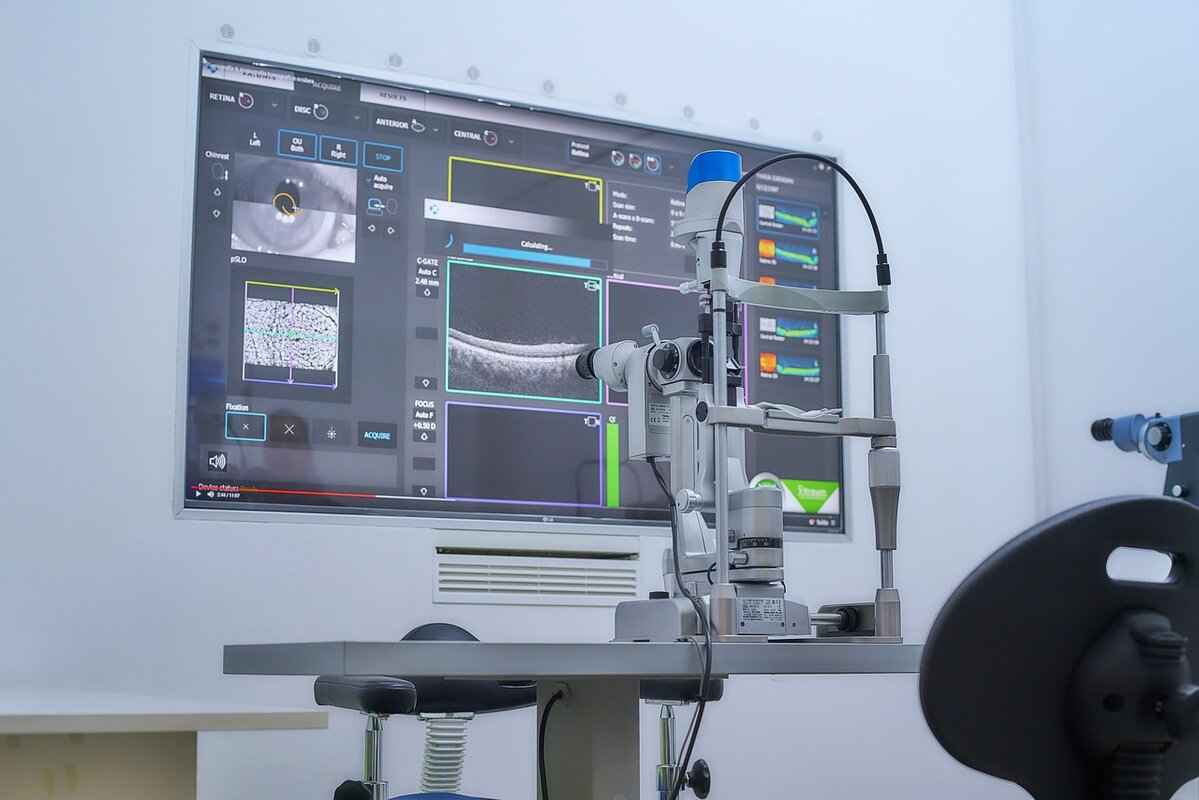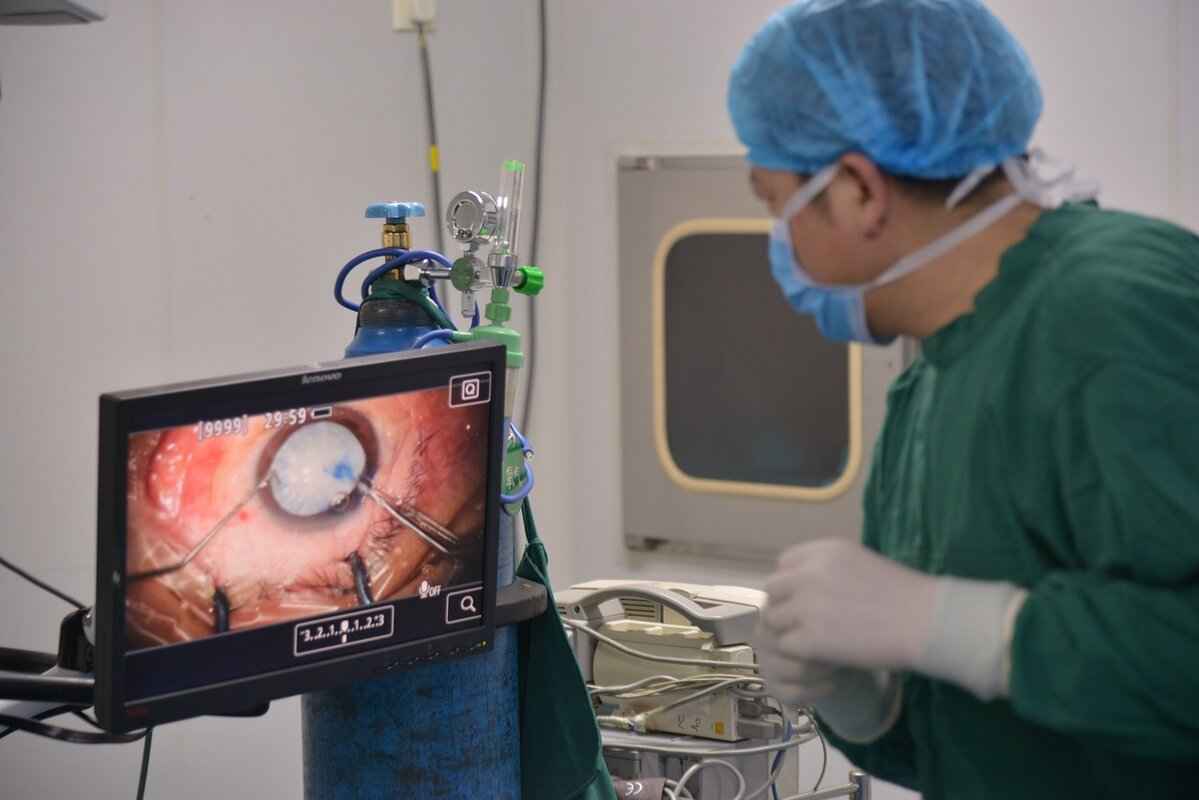This article explores the timeline for cataracts leading to blindness, the signs to watch for, and the various stages of cataract development, providing comprehensive insights for better understanding.
Understanding Cataracts: What Are They?
Cataracts are a prevalent eye condition that occurs when the lens of the eye becomes cloudy, leading to impaired vision. This clouding is primarily caused by the natural aging process, but it can also be influenced by factors such as genetics, diabetes, excessive UV exposure, and certain medications. The biological mechanism involves the accumulation of proteins in the lens, which affects light transmission and clarity. As cataracts progress, they can significantly impact daily activities, making it essential to understand their nature and implications.
What Are the Early Signs of Cataracts?
Recognizing the early signs of cataracts is crucial for timely intervention. Common symptoms include:
- Blurred Vision: A gradual blurring of vision is often one of the first indicators.
- Glare and Halos: Increased sensitivity to light, especially at night, can make driving difficult.
- Double Vision: Some individuals may experience double vision in one eye.
- Faded Colors: Colors may appear less vibrant, which can affect daily activities.
Being aware of these symptoms can prompt individuals to seek medical advice early, potentially delaying further vision loss.
How Do Cataracts Progress Over Time?
Cataracts typically develop slowly, and the rate of progression can vary significantly among individuals. The stages of cataract development generally include:
- Early Stage: Minimal clouding occurs, and vision may still be adequate for most tasks.
- Intermediate Stage: Increased clouding leads to noticeable vision impairment, impacting daily activities.
- Advanced Stage: Severe clouding results in significant vision loss, and surgery may become necessary.
Understanding these stages can help individuals monitor their condition and seek timely treatment.
When Should You Seek Medical Attention for Cataracts?
Knowing when to consult an eye care professional is vital. Key indicators that suggest the need for a comprehensive eye examination include:
- Changes in Vision: Any noticeable changes in vision should prompt an eye exam.
- Difficulty Performing Daily Tasks: If vision impairment affects activities like reading or driving, it’s time to seek help.
- Increased Sensitivity to Light: If glare becomes problematic, it’s essential to consult a specialist.
Early detection and intervention can significantly improve outcomes for individuals with cataracts.
How Long Does It Take for Cataracts to Cause Blindness?
The timeline for cataracts leading to blindness can vary widely among individuals. Factors influencing this timeline include:
- Age: Older adults are at a higher risk of faster progression.
- Health Conditions: Conditions like diabetes can accelerate cataract development.
- Lifestyle Choices: Smoking and excessive alcohol consumption can worsen cataract progression.
On average, untreated cataracts can lead to significant vision impairment within a few years, but proactive management can often delay this outcome.
What Are the Treatment Options for Cataracts?
Understanding treatment options is essential for managing cataracts effectively. These options include:
- Surgical Intervention: The most common and effective treatment is cataract surgery, which involves removing the cloudy lens and replacing it with an artificial one.
- Non-Surgical Options: In early stages, vision aids like glasses may help, but they do not stop cataract progression.
- Lifestyle Modifications: Regular eye exams, a healthy diet rich in antioxidants, and UV protection can help manage symptoms.
Consultation with an eye care professional is crucial for determining the best course of action.
What Happens During Cataract Surgery?
Cataract surgery is a common and generally safe procedure. During the operation, the surgeon removes the cloudy lens and replaces it with an intraocular lens (IOL). The procedure typically lasts about 15-30 minutes and is performed on an outpatient basis. Recovery time varies, but many patients notice improved vision within a few days. Post-operative care is essential for optimal recovery, including follow-up appointments and adhering to prescribed eye drops.
Can Cataracts Be Prevented or Delayed?
While cataracts are often age-related, certain lifestyle choices may help delay their onset. Preventive measures include:
- Healthy Diet: Consuming a diet rich in fruits and vegetables can provide essential nutrients for eye health.
- UV Protection: Wearing sunglasses that block UV rays can reduce the risk of cataracts.
- Regular Eye Examinations: Routine check-ups can help detect cataracts early.
Implementing these strategies can contribute to better eye health and potentially delay cataract formation.
Living with Cataracts: Tips and Strategies
For those diagnosed with cataracts, adapting to changes in vision is important. Practical tips include:
- Utilizing Proper Lighting: Ensure adequate lighting when reading or performing tasks.
- Using Magnifying Devices: Magnifiers can assist with reading and other close-up tasks.
- Staying Active: Engaging in regular physical activity can improve overall health and well-being.
By employing these strategies, individuals can maintain their quality of life while managing cataracts.

Understanding Cataracts: What Are They?
Cataracts are a prevalent eye condition that affects millions of individuals worldwide. They are primarily characterized by the clouding of the lens, which can significantly impair one’s vision. This condition typically develops gradually, leading to a range of visual disturbances that can impact daily life. Understanding cataracts involves exploring their causes, symptoms, and the intricate biological mechanisms that contribute to their formation.
The formation of cataracts is often associated with the natural aging process. As individuals grow older, the proteins in the lens of the eye begin to break down, leading to cloudiness. However, several other factors can accelerate this process:
- Genetics: A family history of cataracts can increase the likelihood of developing them.
- Medical Conditions: Conditions such as diabetes and hypertension have been linked to an increased risk.
- Environmental Factors: Prolonged exposure to ultraviolet (UV) light, smoking, and excessive alcohol consumption can contribute to cataract development.
- Medications: Long-term use of corticosteroids and certain other medications may also increase the risk.
Recognizing the symptoms of cataracts early can lead to timely intervention. Common signs include:
- Blurred Vision: A gradual decrease in visual clarity is often the first noticeable symptom.
- Glare and Halos: Increased sensitivity to light and seeing halos around lights, especially at night.
- Difficulty with Night Vision: Challenges in seeing well in low-light conditions.
- Fading Colors: Colors may appear less vibrant as the cataract progresses.
The lens of the eye is composed mainly of water and proteins. In a healthy lens, the proteins are arranged in a way that keeps the lens clear and allows light to pass through. However, as we age, these proteins can clump together, leading to the formation of cataracts. This process can be influenced by:
- Oxidative Stress: Free radicals can damage the proteins in the lens, contributing to cloudiness.
- Inflammation: Chronic inflammation in the eye may also play a role in cataract formation.
In summary, cataracts are a complex condition influenced by a combination of genetic, environmental, and biological factors. Understanding these aspects is crucial for recognizing the importance of regular eye examinations and early intervention to preserve vision.

What Are the Early Signs of Cataracts?
Recognizing the early signs of cataracts is crucial for timely intervention and effective management. Cataracts develop gradually, and their symptoms can often be subtle at first. Understanding these early warning signs enables individuals to seek medical advice before the condition progresses significantly. Here are some common symptoms to watch for:
- Blurred Vision: One of the most prevalent early signs of cataracts is a gradual blurring of vision. Individuals may notice that their vision becomes increasingly hazy, making it difficult to read, drive, or recognize faces clearly.
- Glare and Halos: Many people with cataracts report increased sensitivity to light. This can manifest as glare from bright lights, particularly when driving at night. Some may also see halos around lights, which can be distracting and disorienting.
- Difficulty with Night Vision: As cataracts progress, night vision can become particularly challenging. Individuals may struggle to see in dimly lit environments, which can affect their ability to navigate safely.
- Faded Colors: Colors may appear less vibrant or washed out due to the clouding of the lens. This can lead to difficulty in distinguishing between similar shades, impacting everyday activities like selecting clothing or recognizing objects.
- Frequent Changes in Prescription: If you find yourself needing new glasses or contact lenses more frequently, it may be a sign of cataract development. The changing clarity of vision can lead to alterations in your prescription.
It is essential to note that these symptoms can also be indicative of other eye conditions. Therefore, if you experience any of these signs, it is vital to consult an eye care professional for a comprehensive examination. Early detection and intervention can significantly improve outcomes and quality of life for those affected by cataracts.
Regular eye examinations are crucial, especially for individuals over the age of 60 or those with risk factors such as diabetes or a family history of cataracts. By staying informed and proactive about eye health, individuals can take steps towards maintaining their vision and overall well-being.

How Do Cataracts Progress Over Time?
Cataracts are a prevalent eye condition that develops gradually, often going unnoticed until they significantly impact vision. The progression of cataracts varies from person to person, influenced by factors such as age, genetics, and lifestyle choices. Understanding the stages of cataract development is crucial for early detection and intervention. This section will explore the stages of cataract formation and their impact on vision.
- Initial Stage: The earliest stage of cataract development may present minimal symptoms. Individuals might experience slight blurriness or difficulty with glare, particularly when driving at night. At this point, the cataract is still small, and vision may remain relatively clear.
- Intermediate Stage: As the cataract matures, symptoms become more pronounced. Vision may become increasingly cloudy, and colors might appear less vibrant. Activities such as reading or using a computer may become challenging. Many individuals notice a significant change in their ability to see in low-light conditions.
- Advanced Stage: In this stage, the cataract has progressed significantly, leading to considerable vision impairment. Individuals may find it difficult to perform daily tasks, and their quality of life can be adversely affected. At this point, the cataract may appear white or yellowish, and clarity of vision is greatly reduced.
- End Stage: If left untreated, cataracts can lead to complete vision loss. However, it is important to note that this process can take years, and many individuals will seek treatment before reaching this stage. Regular eye examinations are essential for monitoring the progression of cataracts and determining the right time for intervention.
The progression of cataracts can be influenced by various risk factors, including:
- Age: The likelihood of developing cataracts increases with age, with many individuals experiencing some degree of clouding by their 60s.
- Health Conditions: Diabetes and other chronic health issues can accelerate cataract development.
- UV Exposure: Prolonged exposure to ultraviolet light can contribute to the formation of cataracts.
- Smoking and Alcohol: Both habits have been linked to an increased risk of cataracts.
Recognizing the signs of cataract progression is vital for timely intervention. If you notice changes in your vision, such as increased difficulty in seeing at night or experiencing frequent changes in your eyeglass prescription, it is essential to consult with an eye care professional. Early diagnosis and treatment can significantly improve outcomes and help maintain quality of life.
In summary, cataracts typically develop slowly and can vary significantly in progression among individuals. Understanding the stages of cataract development and their impact on vision is crucial for effective management. Regular eye check-ups and awareness of symptoms can lead to timely treatment, ultimately preserving vision and enhancing the quality of life.

When Should You Seek Medical Attention for Cataracts?
Understanding when to seek medical attention for cataracts is crucial for preserving vision and maintaining overall eye health. While cataracts are a common condition, early detection and timely intervention can significantly improve outcomes. Below are key indicators that suggest it may be time to consult an eye care professional.
- Blurred or Cloudy Vision: If you notice that your vision has become increasingly blurred or cloudy, it may be a sign that cataracts are progressing. This symptom can affect daily activities such as reading, driving, and recognizing faces.
- Increased Sensitivity to Light: Difficulty seeing in bright light or experiencing glare from headlights at night can indicate worsening cataracts. If you find yourself squinting or struggling to adjust to changes in lighting, it’s essential to seek advice from an eye care specialist.
- Frequent Changes in Prescription Glasses: If you find that your eyeglass prescription is changing frequently, this could be a sign of cataract development. Regular eye exams can help monitor these changes and determine the best course of action.
- Difficulty with Night Vision: Many individuals with cataracts report difficulties seeing at night or in low-light conditions. If this is a concern, it’s important to consult an eye care professional, as they can assess the severity of your condition.
- Double Vision: Experiencing double vision in one eye can be a significant indicator of cataracts. If this occurs, it is crucial to seek medical advice promptly.
In addition to these symptoms, certain risk factors can increase the likelihood of cataract development. These include age, diabetes, prolonged exposure to UV light, and a family history of cataracts. If you identify with any of these risk factors, proactive eye care is essential.
Comprehensive eye examinations are the best way to evaluate the health of your eyes. During these exams, an eye care professional will conduct various tests to assess your vision and the presence of cataracts. If cataracts are diagnosed, they will discuss potential treatment options, which may include lifestyle changes, prescription lenses, or surgery.
In summary, recognizing the signs of cataracts and understanding when to seek medical attention is vital for maintaining eye health. Regular eye examinations and prompt consultations with an eye care professional can help ensure that cataracts are managed effectively, thereby preserving your vision and quality of life.

How Long Does It Take for Cataracts to Cause Blindness?
The timeline for cataracts leading to blindness can vary significantly from person to person. Understanding the factors that influence this timeline is crucial for early intervention and effective management. This section will explore various elements, including age, health conditions, and lifestyle choices, that can impact the progression of cataracts.
- Age: Age is one of the primary factors affecting the onset and progression of cataracts. Generally, cataracts develop more rapidly in older adults, particularly those over the age of 60. As we age, the proteins in the lens of our eyes begin to break down, leading to cloudiness that can impair vision.
- Health Conditions: Certain health conditions can accelerate the development of cataracts. For instance, individuals with diabetes are at an increased risk due to fluctuating blood sugar levels that can affect the eye’s lens. Other conditions such as hypertension and obesity may also contribute to faster cataract progression.
- Lifestyle Choices: Lifestyle factors play a significant role in the development of cataracts. Smoking, excessive alcohol consumption, and prolonged exposure to UV rays can all hasten the formation of cataracts. Additionally, a diet low in antioxidants may contribute to lens damage over time, emphasizing the importance of a balanced diet rich in fruits and vegetables.
The progression of cataracts can be categorized into stages, starting from early development where symptoms may be minimal, to advanced stages where vision impairment becomes significant. In the early stages, individuals may notice slight changes in their vision, such as difficulty seeing in low light or increased sensitivity to glare. As the cataracts mature, these symptoms can worsen, potentially leading to severe vision loss if left untreated.
It’s important to recognize that while cataracts are common, not everyone will experience blindness as a result. Regular eye examinations are essential for monitoring eye health, especially for those at higher risk. Eye care professionals can assess the severity of cataract development and recommend appropriate interventions, which may include lifestyle changes or surgical options.
In conclusion, the timeline for cataracts leading to blindness is influenced by a myriad of factors, including age, health conditions, and lifestyle choices. Understanding these elements can empower individuals to take proactive steps in managing their eye health and seeking timely medical advice when necessary.

What Are the Treatment Options for Cataracts?
Understanding treatment options is essential for managing cataracts effectively. Cataracts, characterized by the clouding of the eye’s lens, can significantly impair vision. Fortunately, there are various interventions available to help individuals maintain their quality of life. This section covers both surgical and non-surgical options, emphasizing the importance of timely intervention and lifestyle modifications.
Surgical Options for Cataracts
When cataracts progress to a point where they interfere with daily activities, surgery is often the most effective solution. The most common surgical procedure is phacoemulsification, where the cloudy lens is broken up using ultrasound and then removed. A clear artificial lens is then implanted in its place. This outpatient procedure typically takes less than an hour and has a high success rate, allowing patients to regain clear vision.
Non-Surgical Interventions
Before surgery becomes necessary, there are several non-surgical interventions that can help manage symptoms:
- Prescription Glasses: Adjustments to eyeglasses or contact lenses can enhance vision in the early stages of cataract development.
- Increased Lighting: Using brighter lights for reading and other tasks can help improve visibility.
- Anti-Glare Coatings: Special coatings on lenses can reduce glare from bright lights, making it easier to see.
Lifestyle Modifications
In addition to medical treatments, certain lifestyle modifications can help slow the progression of cataracts:
- Healthy Diet: Consuming a diet rich in antioxidants, such as fruits and vegetables, may help protect the eyes.
- UV Protection: Wearing sunglasses that block UV rays can reduce the risk of cataract development.
- Regular Eye Exams: Routine check-ups with an eye care professional can help monitor the condition and determine the right time for treatment.
Post-Surgery Care
After undergoing cataract surgery, it is crucial to follow the eye doctor’s instructions for post-operative care. This may include using prescribed eye drops, avoiding strenuous activities, and attending follow-up appointments to ensure proper healing.
In summary, understanding the treatment options for cataracts—ranging from non-surgical interventions to surgical procedures—is vital for effective management. By recognizing the signs early and consulting with an eye care professional, individuals can make informed decisions that will help preserve their vision and enhance their quality of life.

What Happens During Cataract Surgery?
Cataract surgery is a well-established procedure designed to restore vision by removing the cloudy lens of the eye and replacing it with an artificial one. This section provides a detailed overview of the surgical process, recovery expectations, and what patients can anticipate before and after the operation.
The surgical process for cataract removal typically lasts less than an hour and is performed on an outpatient basis. Patients are usually given local anesthesia to numb the eye, along with a sedative to help them relax. The most common technique used is phacoemulsification, where a small incision is made in the cornea, and an ultrasonic device is used to break up the cloudy lens into tiny pieces, which are then gently suctioned out.
Once the natural lens is removed, the surgeon will implant an intraocular lens (IOL) to replace it. There are various types of IOLs available, including monofocal, multifocal, and toric lenses, which can correct for different vision issues. The choice of lens is often discussed during the pre-operative consultation.
Prior to the surgery, patients will undergo a comprehensive eye examination. This includes measuring the eye’s shape and size, which helps in selecting the appropriate IOL. Patients are advised to discuss their medical history and any medications they are taking, as some may need to be paused before the procedure.
On the day of the surgery, patients should arrange for someone to drive them home afterward, as their vision may be temporarily impaired. It is also recommended to avoid wearing makeup or lotions around the eyes on the day of the surgery.
Recovery from cataract surgery is typically quick. Many patients notice improved vision within a few days. However, complete healing may take several weeks. Post-operative care often includes using prescribed eye drops to prevent infection and reduce inflammation.
Patients are usually advised to avoid strenuous activities and heavy lifting for a short period after surgery. Follow-up appointments are essential to monitor healing and ensure the IOL is functioning correctly.
After surgery, it is common for patients to experience some mild discomfort, which can usually be managed with over-the-counter pain relief. Vision may appear blurry at first, but this typically improves as the eye heals. Patients should be vigilant for any signs of complications, such as increased pain, redness, or sudden changes in vision, and report these to their eye care provider immediately.
Overall, cataract surgery is a safe and effective way to restore vision, with a high success rate. Understanding the surgical process and recovery expectations can significantly ease patient anxiety and contribute to a smoother experience.

Can Cataracts Be Prevented or Delayed?
Cataracts are a prevalent eye condition that often develop as part of the natural aging process. However, there are several preventive measures individuals can adopt to potentially delay their onset. This section explores essential lifestyle choices, dietary adjustments, and protective strategies that can contribute to maintaining eye health.
- Healthy Diet: Consuming a diet rich in antioxidants can be beneficial for eye health. Foods high in vitamins C and E, such as oranges, strawberries, spinach, and nuts, may help combat oxidative stress that contributes to cataract formation. Additionally, incorporating omega-3 fatty acids found in fish can support overall eye health.
- UV Protection: Exposure to ultraviolet (UV) light has been linked to an increased risk of cataracts. Wearing sunglasses that block 100% of UVA and UVB rays can protect the eyes from harmful sunlight. Wide-brimmed hats can also provide additional shade and protection.
- Regular Eye Examinations: Scheduling routine eye exams with an eye care professional is crucial for early detection of cataracts. These examinations can help monitor eye health and provide timely interventions if cataracts begin to develop.
- Avoiding Smoking and Excessive Alcohol: Smoking has been shown to increase the risk of cataracts significantly. Quitting smoking and reducing alcohol consumption can lower this risk. Engaging in healthier lifestyle choices can further enhance eye health.
- Managing Health Conditions: Conditions such as diabetes can exacerbate the risk of cataract development. Maintaining a healthy lifestyle, managing blood sugar levels, and following medical advice can help mitigate this risk.
- Hydration: Staying well-hydrated is essential for overall health, including eye health. Adequate water intake can help maintain the health of the eye’s lens and support optimal vision.
Incorporating these lifestyle changes can play a significant role in delaying the onset of cataracts. While it may not be possible to prevent cataracts entirely, adopting a proactive approach to eye health can lead to improved quality of life and vision longevity. By prioritizing nutrition, protection from UV rays, and regular check-ups, individuals can take meaningful steps toward preserving their eyesight.
In summary, while cataracts are often associated with aging, factors like diet, UV protection, and regular eye examinations can help delay their development. Taking charge of your eye health through informed lifestyle choices can make a substantial difference in maintaining clear vision for years to come.

Living with Cataracts: Tips and Strategies
For individuals diagnosed with cataracts, adjusting to changes in vision is a crucial aspect of maintaining a good quality of life. This eye condition, characterized by the clouding of the lens, can significantly impact daily activities. However, with the right strategies and adaptations, one can navigate through these changes effectively.
- Regular Eye Check-ups: It is essential to have regular appointments with an eye care professional. These visits allow for monitoring the progression of cataracts and timely interventions if necessary.
- Utilize Proper Lighting: Enhancing lighting in your home can make a significant difference. Use bright, soft light bulbs and avoid glare by positioning lamps appropriately. This can help reduce the strain on your eyes.
- Use Anti-Glare Lenses: Consider wearing glasses with anti-reflective coatings. These lenses can help reduce glare from headlights at night and improve overall visibility.
- Organize Your Environment: Keep your living space well-organized. Place frequently used items in easily accessible locations to minimize the need for searching in dim lighting.
- Engage in Vision-Friendly Activities: Activities such as knitting, reading large print books, or engaging in hobbies that do not strain the eyes can help maintain focus and enjoyment without causing discomfort.
Consider Assistive Devices: There are numerous tools available to assist those with cataracts. Magnifying glasses, large print books, and even smartphone apps designed for visually impaired individuals can enhance daily living.
Stay Active and Healthy: Maintaining a healthy lifestyle can also contribute to better eye health. Regular exercise, a balanced diet rich in antioxidants, and staying hydrated can help slow the progression of cataracts.
Seek Support: Joining support groups or forums can provide emotional support and practical advice from others experiencing similar challenges. Sharing experiences can be empowering and informative.
By implementing these strategies, individuals living with cataracts can adapt to their changing vision and maintain their independence. It’s important to remember that while cataracts can be challenging, they do not have to define one’s quality of life. With the right approach and resources, individuals can continue to engage fully in their daily activities and enjoy life to the fullest.
Frequently Asked Questions
- What are the main symptoms of cataracts?
The most common symptoms of cataracts include blurred vision, increased sensitivity to glare, and difficulty seeing at night. Many people also experience a noticeable change in color perception, making everything appear more yellow or brown.
- How quickly do cataracts progress?
Cataracts typically develop slowly over several years. However, the rate of progression can vary significantly from person to person. Some may notice changes in their vision within months, while others might take years before experiencing significant vision impairment.
- When should I see a doctor about my cataracts?
If you notice changes in your vision that interfere with daily activities, such as reading or driving, it’s time to consult an eye care professional. Regular eye exams can help monitor the progression of cataracts and determine the best course of action.
- Can cataracts lead to complete blindness?
While cataracts can significantly impair vision, they do not directly cause complete blindness. However, if left untreated, they can lead to severe vision loss that may affect daily life. Early intervention is key to preventing further complications.
- What treatment options are available for cataracts?
Treatment for cataracts typically begins with lifestyle changes, such as using stronger glasses or brighter lighting. If symptoms worsen, cataract surgery is a common and effective option that involves removing the cloudy lens and replacing it with an artificial one.































































